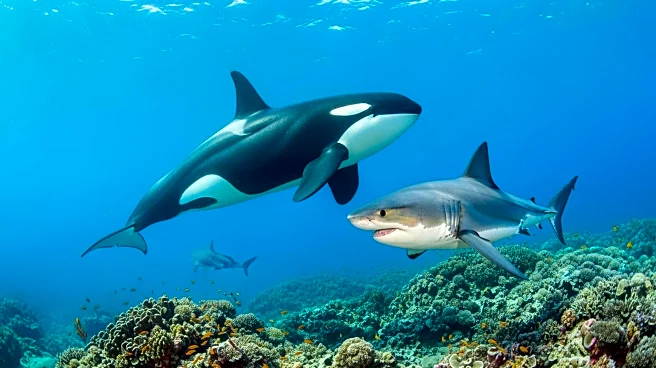What's Happening?
In the Gulf of California, researchers have documented orcas employing a unique hunting strategy to prey on juvenile great white sharks. This marks the first recorded instance of such behavior in Mexican waters and the second globally. The orcas flip
the young sharks upside down, inducing a state of paralysis known as tonic immobility, which allows them to access and consume the sharks' nutrient-rich livers with minimal resistance. This technique, which avoids significant injury to the sharks, highlights the orcas' advanced intelligence and social learning capabilities. The behavior is part of a broader pattern observed in Moctezuma’s pod, a group of orcas known for preying on sharks and rays. Researchers suggest that changes in water temperature may have altered the distribution of white shark nurseries, increasing the presence of juveniles in the area.
Why It's Important?
The discovery of orcas preying on juvenile great white sharks in the Gulf of California has significant ecological implications. It underscores the adaptability and intelligence of orcas, which could impact the local marine ecosystem by altering predator-prey dynamics. The presence of orcas may force juvenile sharks to develop new anti-predator strategies or face increased vulnerability. This behavior could also influence the distribution and population dynamics of great white sharks, as juveniles are crucial for the species' future. The findings highlight the potential impact of environmental changes, such as warming waters, on marine life distribution and interactions, which could have broader implications for marine conservation efforts.
What's Next?
Researchers will likely continue to monitor the interactions between orcas and juvenile great white sharks to understand the long-term effects on shark populations and marine ecosystems. Further studies may focus on the impact of environmental changes on the distribution of marine species and the potential for orcas to adapt their hunting strategies to new prey. Conservationists may use this information to develop strategies to protect vulnerable shark populations and maintain ecological balance in the region.
Beyond the Headlines
The orcas' hunting behavior raises questions about the ethical considerations of human impact on marine environments. As climate change alters ocean temperatures and species distributions, the balance of marine ecosystems may shift, potentially leading to unforeseen consequences. This situation highlights the importance of understanding and mitigating human-induced environmental changes to preserve biodiversity and ecological stability.
















